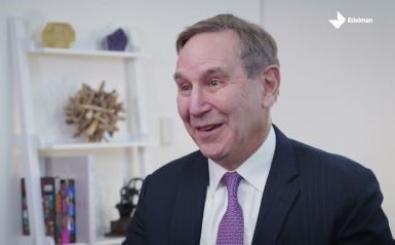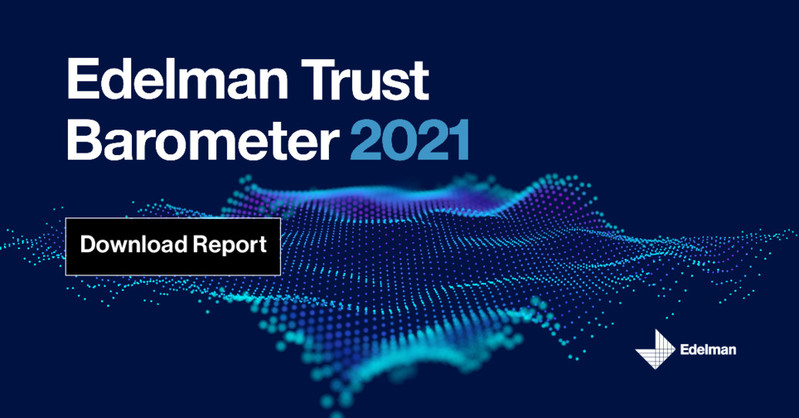The COVID-19 pandemic has put trust to the test while EU institutions and governments faced a global economic and political crisis.
Trust in information is at record low as the four main institutions – Businesses, Government, Media and NGOs – suffered from a stark drop, businesses rank first but none is really deemed reliable. Societal leaders are suspected of spreading lies and feeding mistrust, media score very low, and the mass population is reported to become more and more doubtful in the most powerful countries. Trends show that trust shifted to a local level, a consequence of a strong proximity effect. Employers in the EU have seen their responsibility towards employees change under the form of an authority that could provide consistent and reliable information but also safety.
This year marked an important milestone as the 2021 Edelman Trust Barometer found an era of information bankruptcy where confusion and infodemic shadowed the path to the truth. The global pandemic has been fuelling fears, and the population has proven to be particularly concerned about the economic impact causing job loss, but also climate change effects and cyber-attacks. Interestingly, covid and health risks were not the priority in people’s minds as only 1 out of 4 would have good information hygiene in the EU.
In face of uncertainty, scientists are trusted the most

In his address, Professor Baron Peter Piot, Special Advisor on COVID-19 of the European Commission President Ursula von der Leyen, acknowledged that trust in scientists has reversed in comparison to past trends and achieved an all-time high in modern history today. The relationship between scientists and uncertainty, an important driver of panic and fear in the last months, allowed for such a change. The EU population that has shown clear signs of anxiety in the face of the unknown, has found itself relieved by the cartesian and factual approach brought by science.
Professor Piot further stressed that managing uncertainty constitutes an important factor of success, and policymakers had an incredibly hard time doing so. While COVID-19 pushed science to make astonishing progress, with for example the development of vaccines, it also exacerbated problems already present and distorted the population’s expectancies of reality.
Are vaccines up to standards or not?
According to Professor Piot, the joint procurement of vaccines was the EU at is best, ensuring that all Member states would have access to lifesaving medicines. Health is a cross-border and transboundary issue that requires a joint venture approach. The vaccine hustle did not originate from politicians but would be the result of a number of issues ranging from manufacturing practices and abnormally high expectancies.
Trust issues around vaccines is as old as when it was first invented, but science is today the best answer to the population’s legitimate questions. Today’s hustle is most likely not the result of politicians’ misconduct but rather the consequence of a number of issues ranging from manufacturing capacity, logistical problems, and abnormally high expectancies. What damages confidence the most are the trendy fakes news spread at the speed of light to fill the gap of uncertainty.
The Proximity effect increases employer’s responsibility
Luca Visentini, Secretary-General of the European Trade Union Confederation, brought attention on the unknown recovery phase that lies ahead, which will much likely disrupt the status quo period we are sitting in. The vision of employers has become similar to one of a parent, as an element of protection. But how they will manage to implement the future wave of disruption expected to come remains the central question. The impact of sustainable transition, automation, and digitalisation on the labour market in a post-pandemic recovery period will determine whether trust in employers is a new pilar or just a trend.
Trust in media has scored an all-time low, but the growing scepticism would also find its roots in the increasing precariousness present in the work of journalists. The lack of stability has an effect on liability and responsibility creating circumstances favourable to misconduct.
The relationship with misinformation

“Misinformation has always been present in our lives and at all levels”, said Seana Davis, Social Media Correspondent and Misinformation Specialist. A key factor prevailing in times of crisis is to achieve excellent communication, and the COVID-19 crisis has witnessed an important confusion. The emotional element brought by fear in a context of a health emergency crisis exacerbated the information overload we now call infodemic. The need of an answer suffered from a staggering growth as the void left by uncertainty kept increasing. To remedy that problem, it is important to emphasise both an empathic and transparent approach to give context and better educate the public.
A strong level of trust in science could help reverse the trend of the current media distrust. The intersection between media literacy and science literacy in information gathering and fact-checking is unknown and could present an opportunity to change perceptions.
Solve or sell?
Are businesses ready to solve societal issues in addition to selling their products or services, was the question asked to Robert O’Mera, Communication Director at the European Round Table for Industry. The Trust Barometer report highlights that people expect CEOs to be more active in the field, and they are. Without the many initiatives of the private sector to cope with the lack of structure, equipment and resources present at the beginning of the pandemic, the outcomes would have most likely not have been the same. But businesses cannot be expected to solve all societal problems. They, nonetheless, constitute a very important stakeholder and are eager to fulfil their role along with Governments, Medias and NGOs.
Discussing the recent focus placed around their expected role, Gurpreet Brar, General Manager of Edelman Brussels, said:
“Business are trusted across the political spectrum, and consistently continue to show up as a trusted vehicle”
In order to better address future challenges, a long-term vision with a leadership involving the four main societal actors is of paramount importance. Trust results have marked one of the lowest points in the barometer’s history but there also lies an opportunity for redemption.






